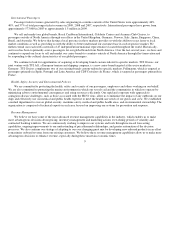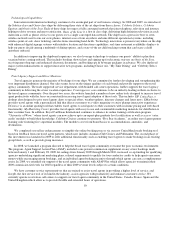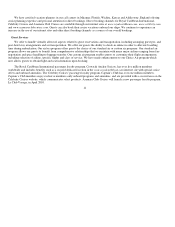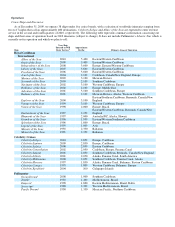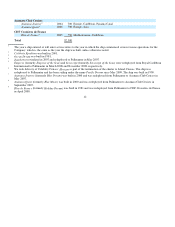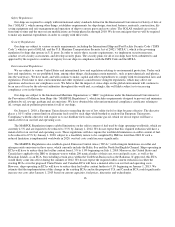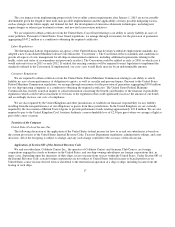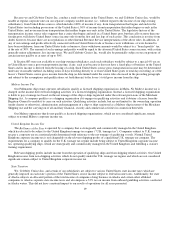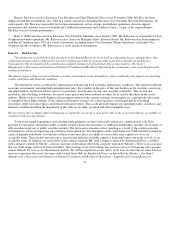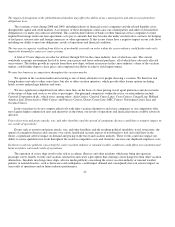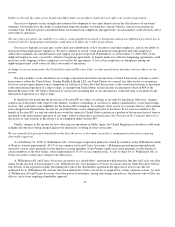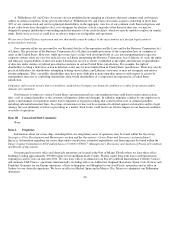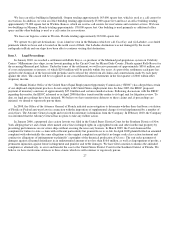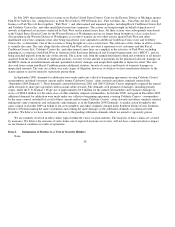Royal Caribbean Cruise Lines 2009 Annual Report Download - page 28
Download and view the complete annual report
Please find page 28 of the 2009 Royal Caribbean Cruise Lines annual report below. You can navigate through the pages in the report by either clicking on the pages listed below, or by using the keyword search tool below to find specific information within the annual report.
A foreign corporation will qualify for the benefits of Section 883 if, in relevant part: (1) the foreign country in which the foreign
corporation is organized grants an equivalent exemption to corporations organized in the United States; and (2)(A) more than 50% of
the value of the corporation’s capital stock is owned, directly or indirectly, by individuals who are residents of a foreign country that
grants such an equivalent exemption to corporations organized in the United States, or (B) the stock of the corporation (or the direct
or indirect corporate parent thereof) is “primarily and regularly traded on an established securities market” in the United States or
another qualifying country such as Norway. In the opinion of our United States tax counsel, Drinker Biddle & Reath LLP, based on
the representations and assumptions set forth in that opinion, we, Celebrity Cruises Inc. and our ship-owning subsidiaries qualify for
the benefits of Section 883 because we and each of those subsidiaries are incorporated in Liberia or Malta, which are qualifying
countries, and our common stock is primarily and regularly traded on an established securities market in the United States or Norway.
If, in the future, (1) Liberia no longer qualifies as an equivalent exemption jurisdiction, and we do not reincorporate in a jurisdiction
that does qualify for the exemption, or (2) we fail to qualify as a publicly traded corporation, we and all of our ship-owning or
operating subsidiaries that rely on Section 883 for tax exemption on qualifying income would be subject to United States federal
income tax on their United States source shipping income and income from activities incidental thereto.
We believe that most of our income and the income of our ship-owning subsidiaries is derived from or incidental to the
international operation of a ship or ships and, therefore, is exempt from taxation under Section 883. In 2005, final regulations became
effective under Section 883, which, among other things, narrowed somewhat the scope of activities that are considered by the Internal
Revenue Service to be incidental to the international operation of ships. The activities listed in the regulations as not being incidental
to the international operation of ships include income from the sale of air and land transportation, shore excursions and pre- and post-
cruise tours. To the extent the income from these activities is earned from sources within the United States, that income will be
subject to United States taxation; but the determination of the precise amount of such United States source income involves some
uncertainties.
Under certain circumstances, changes in the identity, residence or holdings of our direct or indirect shareholders could cause our
common stock not to be “regularly traded on an established securities market” within the meaning of the regulations under
Section 883. To substantially reduce any such risk, in May 2000, our Articles of Incorporation were amended to prohibit any person,
other than our two existing largest shareholders, from owning, directly or constructively as determined for purposes of Section 883(c)
(3) of the Internal Revenue Code and the regulations promulgated under it, more than 4.9% of the relevant class or classes of our
shares. Under Liberian law, this amendment may not be enforceable with respect to shares of common stock that were voted against
the amendment or that were recorded as abstaining from the vote.
Also, it should be noted that Section 883 has been the subject of legislative modifications in past years that have had the effect
of limiting its availability to certain taxpayers, and there can be no assurance that future legislation will not preclude us from
obtaining the benefits of Section 883.
Taxation in the Absence of an Exemption under Section 883 of the Internal Revenue Code
If we, Celebrity Cruises Inc., or our ship-owning subsidiaries were to fail to meet the requirements of Section 883 of the Internal
Revenue Code, or if the provision was repealed, then, as explained below, such companies would be subject to United States income
taxation on a portion of their income derived from or incidental to the international operation of our ships.
18


